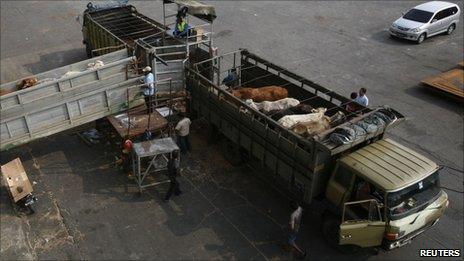Did animal cruelty report lead to an over-reaction?
- Published
- comments

No Australian cattle will arrive in Indonesia for the next six months
More than a week after its broadcast, powerful reverberations are still being felt from the ABC Four Corners investigation, external into the mistreatment of Australian cattle in Indonesian abattoirs.
An extraordinarily jolting piece of television journalism, the public response to the footage was immediate and visceral. Before the programme was over, distressed viewers had already started calling their lawmakers demanding an end to live cattle exports to Indonesia.
The following morning, the websites of animal welfare groups, like Animals Australia and RSPCA, could not cope with the number of people who wanted to sign their online petitions. Radio talkback shows were deluged with angry calls.
Australia's butchers have also experienced a backlash. The Australian Meat Industry Council says there has been a 15% drop in sales as consumers shunned beef. And this comes despite many consumers being aware than animals in Australia are slaughtered far more humanely.
Last week, the Australian government announced a ban, external on live cattle exports to the 12 abattoirs featured in the report. Labor MPs, who had also watched in horror, demanded nothing less.
But under pressure from the public and facing something of a backbench revolt on the issue, now the government has gone further and announced a temporary suspension on all live exports to Indonesia. The ban will remain in place for at least six months, in the hope that safeguards can be introduced at Indonesian abattoirs. Australia's Agriculture Minister Joe Ludwig said the ban would remain in place until the government received assurances that animals would be treated with more care.
Peculiarly, the Four Corners programme - fronted by same journalist, Sarah Ferguson, who was behind the Code of Silence expose of rugby league in 2009 - received its lowest viewing of the year. However, no piece of television journalism aired in Australia in the past 12 months has had such an profound impact on the public and, more importantly, government policy.
There are fears within rural communities that a blanket ban could destroy livelihoods. Australia exports 900,000 cattle each year, and the vast majority go to Indonesia. As this report from the Northern Territory, external shows, even a temporary suspension will not only hit cattle farmers, but all the support industries, like trucking firms and, more curiously, helicopter mustering groups. There's another piece here about the reaction to the suspension, external.
The Nationals Senator Barnaby Joyce has said the ban is an over-reaction. "We have over-reached and that will have consequences," he said.
There are voices in the cattle industry who believe that a short-term ban will save the Australian cattle export industry in the longer-term through the introduction of much-needed improvements to the slaughtering process in Indonesia.
So is this a proportionate response? Or will the cost for the rural economy simply be too much to bear?
By the way, for those interested in how the programme was put together, there is an interesting piece here, external.
Jonathan Holmes, the presenter of ABC's Media Watch, also offers some telling insights, external on this genre of reportage.